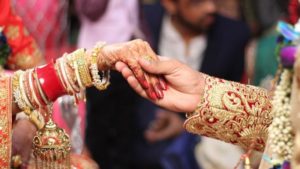
Suppose two people want to get married and if they belong to different denomination, what will they do? Will convince the family members or go to the marriage officer under the special marriage act and apply for marriage.
According to the law, they have to give this application at least a month before the date of marriage. But if the matter was as simple, then Reshma and Raju (name changed) would not have to go to the Allahabad High Court.
In fact, the Special Marriage Act itself says that the marriage officer will paste this application on the notice board of the government office in the form of notice. That is, the purpose of secretly marrying couples who come to marry in secret, is not complete here.
Those people who marry and go to other places, according to this law, these notices will be put in the office of the marriage office of their home town. If the process is not followed, the marriage officer could face a jail term of up to one year.
But after a fresh decision of the Allahabad High Court, the situation will change and couples like Rehana and Raju will not have to go through the ‘hurdle’ of any such public notice to get married.
What did the Allahabad High Court say
A single bench of Justice Vivek Chaudhary said in the case, “If they want to know more about their partner who wants to marry the Special Marriage Act, then they can use section 6 to get notice of their wish “
“It would not be a violation of their fundamental right because they would have chosen it on their own free will. So it would be possible to get notice under section 6 and invite objection under section 7 only on the appeal of the people desirous of marriage, apart from that.”
“Therefore, the court makes it mandatory that those who give notice of getting married under section 5 of this act, at the same time they will also have the option to appeal to the marriage officer in writing that they publish their marriage notice Want it done or not. “
“If they do not make any written request to get published, then the marriage officer will neither publish the notice of their marriage and will not take cognizance of the objections coming on it.”
“However, the marriage officer has the right to verify the identity, age, consent and eligibility of both parties before getting married under the Special Marriage Act. If he has any doubt, he can ask for information and evidence.”
Story of reshma and raju
In this case, Reshma told the court with the help of Raju that she has converted to Hinduism as per Hindu customs but her father is not allowing her to live with her husband.
Reshma said in her petition that both of them are adults, both have married at their own will and both want to live with each other.
Therefore, it is illegal for the father to keep him under his supervision.
When called in front of the court, Reshma told these things and said that she wants to live with her husband.
However, Reshma’s father also said in front of the court that his daughter has turned into an adult and she has married to his will and they accept Reshma’s decision.
Big legal questions
Justice Chaudhary has written in his judgment that with Reshma’s father accepting this marriage, the matter would end but Reshma and Raju told the court that they wanted to get married under the Special Marriage Act. But in this law, there is a condition of giving 30 days advance notice and by doing this the whole world would know.
Raju and Reshma said that such a notice would violate their privacy and this would put undue social pressure on their marriage. Both of them also said that people who wish to get married in situations like theirs have difficulty in choosing the partner of their choice.
Reshma and Raju’s counsel also told the court that the situation has become more complicated after the notification of the ‘Uttar Pradesh Laws Against Religion Transformation Prohibition Ordinance, 2020’ as this law prohibits conversion to marriage.
The court said that most of the marriages in the country are under their own religious customs and there is no provision to publish any notice or call upon the objections of the people. If someone marries by lying or hiding information, then such marriage is prohibited under any law. If such a situation arises, the court can hear anytime and reject such a marriage.
Justice Chaudhary wrote at the end of his decision, “Since this matter is related to the protection of the fundamental right of a large population, the senior registrar of the court should send a copy of this order to the Principal Secretary of State who is responsible for the state’s marriage officers and the concerned We will deliver it to the officials as soon as possible. “
It has been said in the decision that Reshma’s father has also blessed both of them with a happy married life.

















































